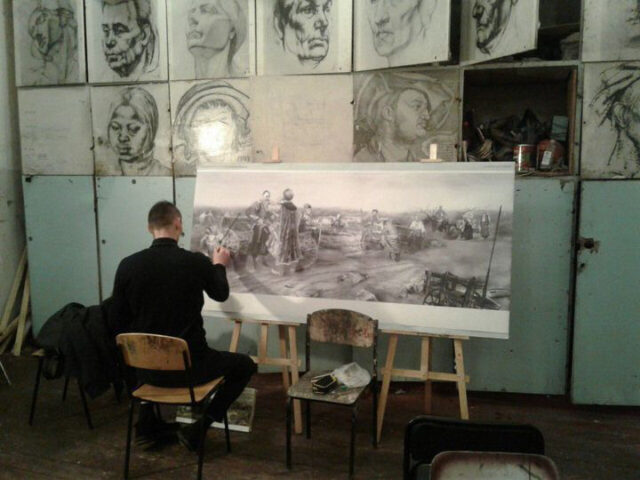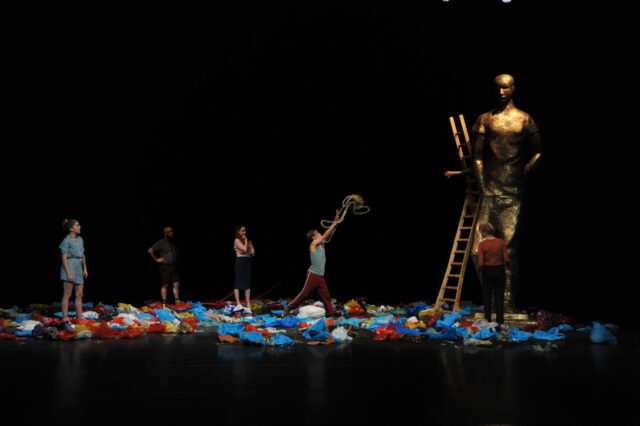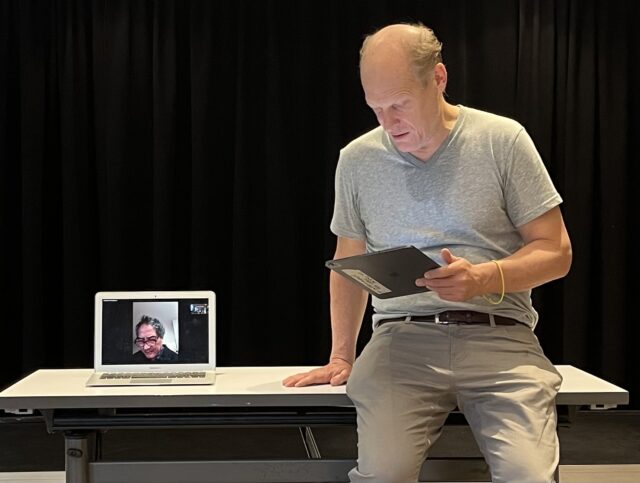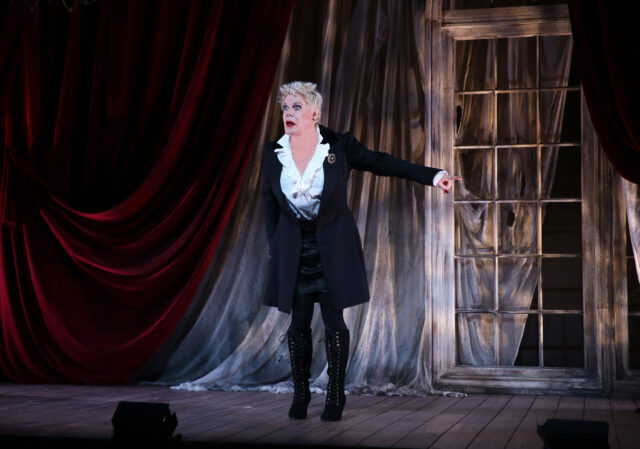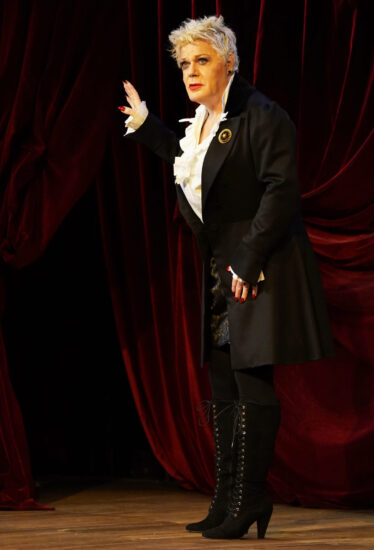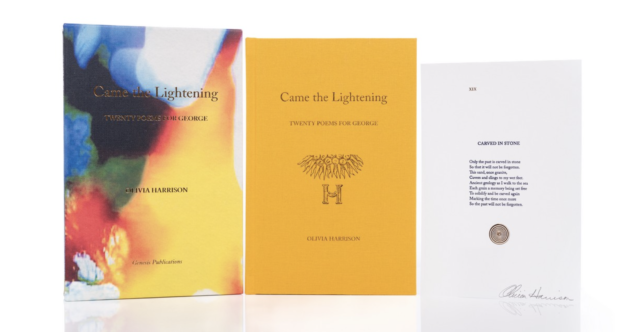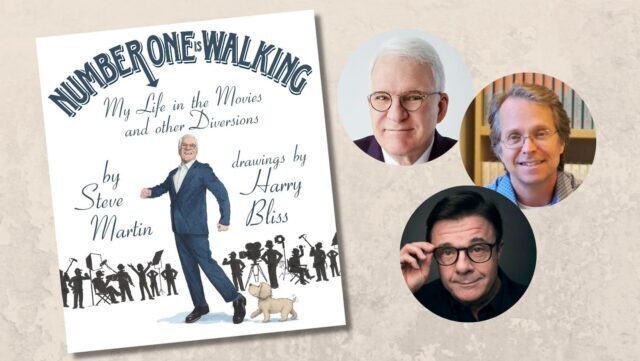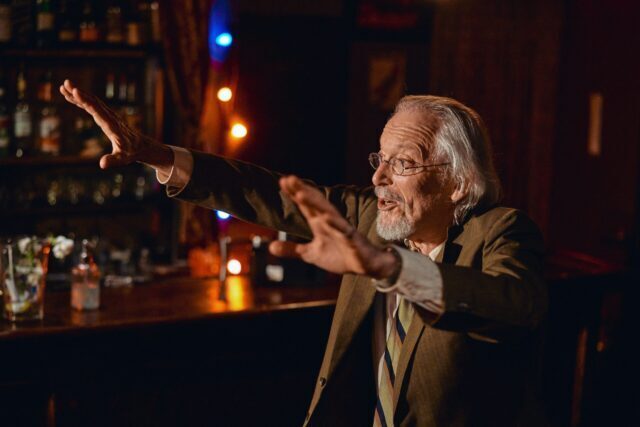
Ronald Guttman brings his one-man show, Albert Camus’ The Fall, to the Huron Club at SoHo Playhouse (photo © Zack DeZon)
ALBERT CAMUS’ THE FALL
The Huron Club at SoHo Playhouse
15 Vandam St. between Varick St. & Sixth Ave.
Wednesday – Saturday through November 19, $51, 7:30
www.sohoplayhouse.com/the-fall
www.highbrow.net
Theater is all about the connection between audience and performer. During the pandemic lockdown, I watched hundreds of livestreamed or prerecorded shows, but being at home in front of your computer by yourself is not the same as sitting in a dark venue with other people as a story unfolds in front of you, told by live actors.
Among the memorable virtual plays I watched was Albert Camus’ The Fall, Alexis Lloyd’s adaptation of Camus’ final novel, known in French as La Chute. The book was published in 1956; Nobel Prize winner Camus, who also wrote A Happy Death, The Stranger, and The Plague, would die four years later in a car accident at the age of forty-six. The one-man show starred Belgian-born actor Ronald Guttman onstage in FIAF’s Tinker Auditorium on October 1, 2020, with an audience of twenty-five.
Guttman has been presenting various iterations of The Fall, which he first read when he was seventeen, for more than two decades; the latest version, directed by Didier Flamand, takes place in the Huron Club at SoHo Playhouse, a downstairs bar with a small stage. The audience is seated at round tables, several of which are only a few feet from the stage; there is also a row of barstools. The walls are plastered with images of women, in framed pictures and pages from magazines, along with a few travel posters; the stage features a backdrop of an Amsterdam canal. Guttman, wearing an old brown suit, his long white hair nearly reaching his shoulders, enters from the rear of the room, instantly making eye contact with just about everyone. It’s an exciting moment that can’t be experienced virtually. He walks onstage and then scans the crowd again, deciding which member of the audience will serve as a stand-in for the man his character addresses directly in the book, which is essentially a public confession by Parisian ex-pat former lawyer Jean-Baptiste Clamence, delivered to an unidentified person in a seedy dive bar in Amsterdam’s red light district.
The night I went, he selected me.
“Pleased to make your acquaintance. You’re probably . . . a businessman? Kind of a businessman? We all tend to be kind of, in almost everything,” he says to me at the start, carefully looking me over. “Let me guess, if you don’t mind. You’re in your fifties, you’ve been around, kind of . . . Your hands are clean, and you’re well dressed, kind of. You’re upper-middle class, but . . . sophisticated upper-middle class. And you find me amusing, which means you’re open minded. Kind of.” He didn’t do too bad, although I was wearing a jeans jacket and a black mask. (Masks are optional.) I would nod, shake my head, or laugh in response, confident the best thing was to say nothing.
He then turns to the rest of the audience and explains, “As for me, well, I’ll let you be the judge of that. In spite of my good manners, and my way with words, I am a regular of these sailors dives, here in Amsterdam. There’s only one thing simple about me: I don’t own anything. I used to, I used to be wealthy, back in Paris.”
Looking at me once again, he adds, “Which makes us compatriots, I imagine?”
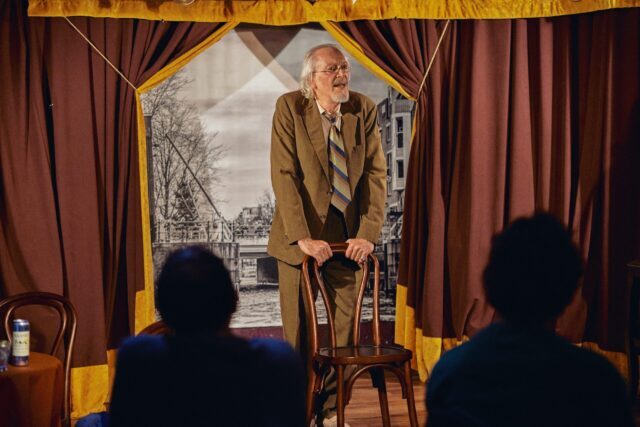
Ronald Guttman is mesmerizing as Parisian ex-pat former lawyer Jean-Baptiste Clamence in The Fall (photo © Zack DeZon)
It’s a fabulous opening to this immersive experience, in which Clamence shares aspects of his private and professional life as he walks around the space, gets drinks from the bartender — who spends the sixty-minute show reading a copy of Playboy — and stops by each table to make sure everyone is involved in his tale. He moves and speaks with an eloquent, elegant poetry as he explores the nature of truth and humanity’s innocence, and its guilt. “I look trustworthy, don’t you think?” he asks. “If thieves were always condemned, honest people would always feel innocent, and that would be a disaster.”
He talks about his success with women, about his insufficiencies, about shame. “Think for a moment about your own life, search your own memories, maybe you’ll find something of that kind,” he says. “Something you’ll tell me later, one day.”
The centerpiece is a rainy November night when Clamence — a play on the word clemence, which means “forgiveness” — passes a woman on a bridge, then hears a loud splash in the river below, along with several screams, followed by silence. “I wanted to run to her, but I didn’t move,” he admits. He walks away, convincing himself there was nothing he could do. It’s a poignant parable for the choices we all have to make every day. Camus is forcing us to put ourselves under the microscope, facing what we’ve done, what we haven’t done, and whether there’s still time to confess and change, how to avoid being judged but still be punished.
“You can never really prove anybody’s innocence, but you can be sure we’re all guilty,” he says. “Every man bears witness to the crimes of all the others, such is my faith, such is my only hope.”
Guttman (Bauer, Patriots) is mesmerizing as Clamence; he embodies the character from the moment he enters the Huron Club. We are not so much watching a one-man show as listening to a stranger telling us about his life and how we can learn from his story as we, perhaps, become friends.
“I don’t have any friends anyway, not anymore. I only have accomplices. But I have a lot of them; they are the whole of mankind,” he tells everyone. He then looked right at me and said, “And within mankind, you. You’re the first of my accomplices. The one who is there is always the first accomplice.”
Consider me guilty as charged.
